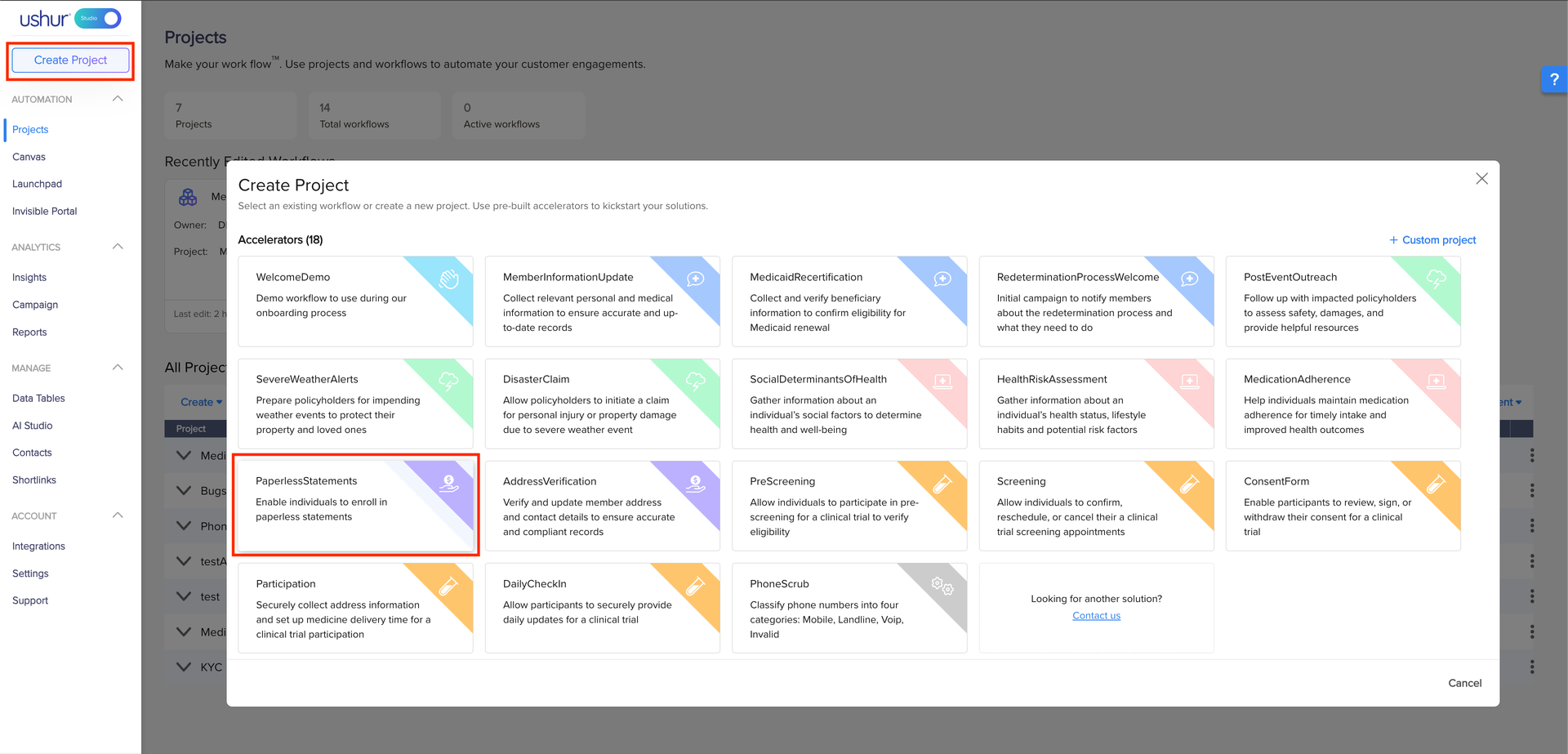- Print
- DarkLight
- PDF
Paperless Statements Accelerator
Overview
The purpose of this accelerator is to enroll the end-user in Paperless Statements. Switching to paperless statements is essential as it helps reduce environmental impact, enhance security, and improve record-keeping. With this accelerator, there's no need to send hard copies, fill endless forms, or rely on insecure mail, eliminating constant follow-ups. This accelerator provides a streamlined enrolment process, ensuring accuracy and efficiency.
Below is a step-by-step guide to securely enroll an end-user in paperless statements through the secure Ushur Invisible App.
Accelerator Navigation
Navigate to Create Project > PaperlessStatements.

The Workflow

To configure the workflow settings, refer to Configure the Setup and Start Option.
Description of the Steps
Step Name | Description/Functionality |
|---|---|
Welcome! | First engagement with the end-user with a welcome message stating the purpose of the engagement is if the end-user wants to enroll in paperless statements. |
Declined | Ending the engagement if the end-user declines to receive paperless statements, confirming the end-user will continue to receive paper statements. |
Verify/UpdateEmailAddress | If the end-user agrees to receive paperless statements, sending the end-user the link to the Invisible App and within the Invisible App the end-user verifies its email address stored in the records and updates if necessary. |
Confirm | Last engagement with the end-user confirming they will receive paperless statements from the next month at their email address. |
Pre-Defined Tags Configuration
To Configure the pre-defined tags, navigate to Setup & Start > Data.

Tag Name | Tag Description |
|---|---|
AgreePaperlessStatements | If the end-user agrees to enroll in paperless statements.
|
BankName | Name of the bank |
EmailAddress | Email address of the end-user |
EmailAddressConfirmation | If the end-user confirms its email address
|
FirstName | First Name of the end-user |
LastName | Last Name of the end-user |
PhoneNumber | Phone number of the end-user |
Additional Enhancement Suggestions
Add reminders
You can remind the end-user to finish incomplete engagements through Enable Reminders. Refer to the General Tab.
Add MFA (Multi-factor authentication)
Enable OTP-based multi-factor authentication for the Invisible App. Refer to the Invisible App Tab.
Send Email Confirmation
In the Confirm Step, you can add an Email Module to send the end-user an email confirmation. For more information, refer to the Email Module.
Offer additional banking operations at the end of the engagement
At the end of the engagement, ask the end-user if they want to perform any other banking operations (like ‘View Loan Statement’, ‘Review Transaction History’, ‘Address Verification’, ‘Update Contact Information’ etc.) and launch the respective workflow using the Launch Workflow module. For more information refer to the Launch Workflow Module.
Data Integration
Data Table is the data from the Enterprise that Ushur utilizes within the workflow and then exports it back to the Enterprise. For more information refer to Data Tables.
 Import Data Module |  Export Data Module |
Import Data Module
The Import Data module helps you to integrate the data table records into the workflow tags. You can use the tags to display data or ask the end-user to update the value of the tags. To integrate the data table records into tags, follow the below steps:
Drag and drop or double-click the Import Data module into the Inspector Panel of the Welcome Step and double-click to configure it.
From the Datatable to link dropdown select the data table from which you want to import data.
Choose the Unique key of your data table and select the record to link the key value from the respective dropdowns.
Select the next step to be executed from the On Error Branch to drop-down in case an error occurs while fetching the data.
Select the Copy Data From checkbox and map your data table properties to the respective tags.
Select the tag from the Save To dropdown. The tag descriptions are described above in the Tag Description Table.
You can also store the data table properties into new tags, scroll down to the bottom of the Save To dropdown to find the New Tag button.
Export Data Module
The Export Data module helps you store the tags’ information in the data table or a predefined SFTP server. To export the values of the tags into the data table:
Create a New Step by clicking the Connector
 icon of the Confirm Step.
icon of the Confirm Step.Click the Add Step option. You can name the New Step according to your preference.
Click and hold the Connector
 icon of the Declined Step and drag to the New Step created.
icon of the Declined Step and drag to the New Step created.Drag and drop or double-click the Export Data module into the Inspector Panel of the New Step and double-click to configure it.
Under Export to choose your export destination as Datatable.
Select the data table you want to export data to from the Export to Datatable dropdown.
Select a destination datatable column from the Export to dropdown for all the tags whose data you want to export.
An Example of Setting Up The Data Table
Properties of the data table.

Data in the Data Table before executing the workflow.

Data in the Data Table after executing the workflow.


